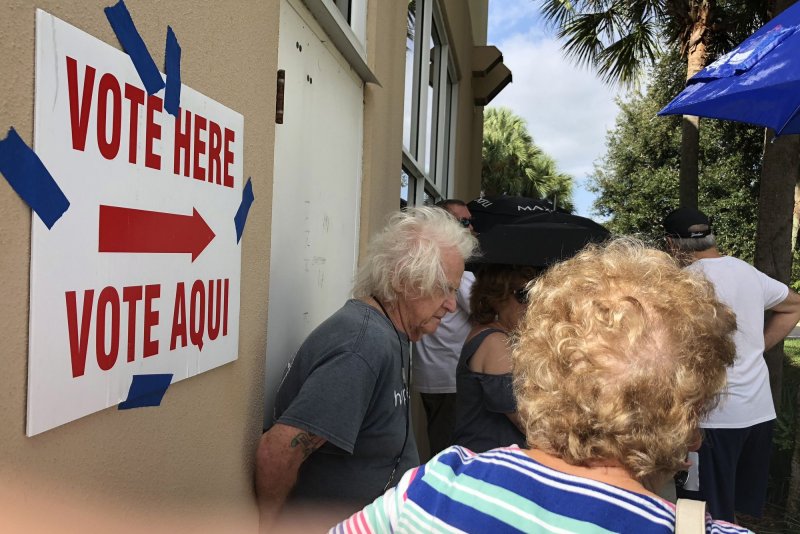There is still a way for you to cast a ballot Tuesday if you're turned away at the polls. Photo by Gary I Rothstein/UPI |
License Photo
Nov. 6 (UPI) -- Tuesday is Election Day in the United States, where many states have reported problems at the polls in the early voting period.
If you arrive to cast your vote and are turned away, there is action you can take to contest the decision.
Laws vary by state, but many require voters to show government-issued identification and addresses and signatures that match what's on file with the elections office. The laws are aimed at preventing voter fraud.
If you believe you are turned away unfairly, one of the things you can do is ask for a provisional ballot.
"People should never be turned away," Julie Ebenstein, senior staff attorney for the American Civil Liberties Union's Voting Rights Project, told UPI. "They're entitled to a provisional ballot. Insist on it. It's a good stop-gap and backup tool if it can't be settled at the polls."
A provisional ballot is a real ballot, but polling places will simply hold onto it until you prove you're registered and eligible to vote. Provisional ballots are factored into the total when the final vote is canvassed.
The nonpartisan Election Protection coalition has established a hotline voters can call to report problems (1-866-OUR-VOTE).
Experts also recommend finding your polling place in advance. At the Vote.org website, you can find your polling place and check your registration status.
The number of voters turned away has increased dramatically since the U.S. Supreme Court's decision in Shelby County v. Holder in 2013. Before that, states had to get the Justice Department's approval before changing election requirements. Now, nearly half of all states have new laws without the need for federal review.
Click here to see what's required in each state.
While some see the ruling as a win for voters, some civil rights groups view it as a form of voter suppression.
"Blacks and Hispanics are less likely to have the types of voter ID that states have started to require," Ebenstein said.
On Friday, a federal Judge in North Dakota denied a Native American tribe's last-ditch attempt to suspend the state's voter ID law. At issue is natives who live on reservations don't have a typically recognized street address; they use a separate mailing address like a post office box.
Groups scrambled to help the tribes get the issue resolved in time for Election Day, but many will likely have to use a provisional ballot.
Texas has a strict voter ID law that has been challenged in court multiple times. In 2017, lawmakers changed it to allow voters to cast a ballot without ID if they can provide proof of residency and sign a form swearing they had a "reasonable impediment" to getting a photo ID.
Some Texas voters could be listing fake addresses in their attempt to register to vote.
State Sen. Paul Bettencourt said more than 1,000 voter registrations list a UPS store in Harris County as their physical address, and directed authorities to investigate. Texas voters must be registered to vote at their physical address.
In some states there are also concerns that voter rolls were purged, voter registrations were put on hold or that voters were automatically turned "inactive" if they hadn't voted within a certain period of time.
Georgia has a policy requiring voter application data to be an exact match for what's on file, putting more than 50,000 applications in limbo on Election Day.
"We concerned that people will show up and come to realize that their application hasn't been completed," Ebenstein said.
The ACLU sued Florida after Hurricane Michael to extend the deadline to register, because so many people were displaced or evacuated ahead of the storm. Some may have to use absentee ballots.
"We're trying to work with Florida to ensure that people have access to polling places and access to information," Ebenstein said.
The ACLU has been fielding calls and complaints during early voting and Ebenstein anticipates additional calls on Tuesday.
"We hope that we've resolved as many of those issues as we can during the early voting process," she said. "I'm sure there will be concerns, I'm sure there will be errors and people will run into the issues but hopefully nothing that can't be resolved."















